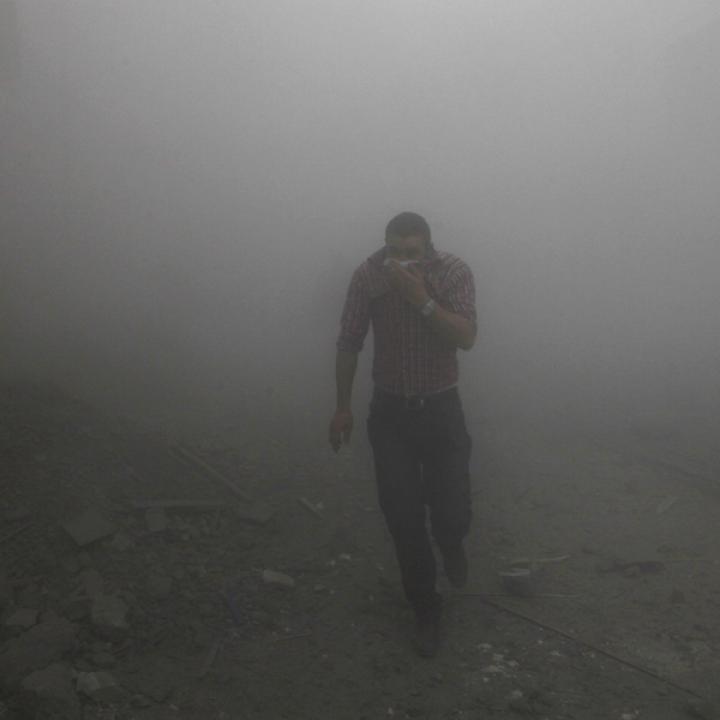
- Policy Analysis
- Articles & Op-Eds
America Must Send a Strong Message to Syria That Using Chemical Weapons in War Is Not Acceptable

The latest regime attack has once again shown that any effort to confront the Islamic State in Syria must also confront Assad.
Bashar Assad has struck again. The Syrian regime has carried out an air attack using Sarin gas in the town of Khan Sheikhoun. Early reporting from the Syrian Observatory for Human Rights suggests as many as 100 are dead, many of them children. As if it was not enough to drop chemical weapons on the town, the regime then targeted, with an airstrike, the clinic where the victims of the chemical assault were being treated.
These attacks are part of a wave of aerial bombardments that Assad's air forces have been conducting across Idlib province in northwestern Syria -- an area where opposition forces continue to maintain a presence and control. Clearly, the ceasefire that Russia claims to have brokered with Turkey and Iran does not apply to Assad's forces. And when it comes to the Assad regime, there can be no doubt that it did not destroy or ship out all of its chemical weapons -- notwithstanding its commitment to do so as part of the 2013 deal the U.S. and Russia negotiated. Worse, it feels free to use them.
While the Trump administration is still in the process of formulating its policy on Syria, this is a moment that should crystallize its focus and make clear it cannot deal only with ISIS. There is no answer to ISIS in Syria that does not also address Assad. The statement that Secretary of State Rex Tillerson made in Turkey that the future of Assad was up to the Syrian people seemed to reflect the changing realities in Syria and the Assad clique's increasingly secure hold on power.
But any policy that leaves the regime intact or does nothing to show there will be a high price for using chemical weapons will only ensure the appeal of those in Syria who are prepared to continue to fight Assad. Unfortunately, that means increasingly radical Sunni Islamist groups, including Jabhat Fateh al-Sham, an offshoot of al-Qaeda.
Moreover, the President and his national security team have emphasized their commitment to stopping proliferation. Surely that must involve creating a real prohibition against the use of any weapons of mass destruction, including chemical weapons (CW). The White House called the CW attack "reprehensible" and appropriately placed blame on Assad.
Should it stop there and do no more, it would be sending the message that using CW in war is acceptable. It is not just Assad who will be affected by this but any leader in a conflict who believes he can gain advantage by using chemical weapons.
To be sure, there is an additional point: Assad is violating the very agreement that the Obama administration worked out with the Russians. So this also becomes a good time to see whether agreements with the Russians, when they are violated by a third party, mean anything. Indeed, here is an opportunity for the administration to see what the Russians will do.
I have previously written that any cooperation with Russia in Syria must be predicated on the Russians no longer abetting Iranian power in that country. That remains a good test because there is a larger struggle going on in the region and our traditional partners -- Arabs and Israelis -- feel threatened by Iran and its use of Shia militias to gain leverage and dominant influence throughout the area.
But here is a more immediate test. If Russia chooses to deny that the Assad regime -- the only Syrian party in the war that has an air force -- was responsible for this attack, the message will be loud and clear: no cooperation with the Russians in Syria is possible. It will indicate that the Russians will continue to go to great lengths to protect the Assad regime, no matter how many war crimes it commits. It will show agreements with the Russians, at least on Syria, are purely situational; so long as they serve Russian interests they will be observed, and they will be abandoned when they do not. Alternatively, if the Russians join us in condemning the action, imposing sanctions on the regime, and insisting that Assad now permit complete access to ensure the destruction of the remaining chemical weapons on hand, we will at least have something to discuss.
Ultimately, the Trump administration must have a policy on the Assad regime. It cannot be a partner in the fight against ISIS or the other radical Sunni Islamists in the opposition as Assad serves as the greatest single source of recruitment for them. Testing the Russians on their response to Assad's use of chemical weapons is one thing for the administration; being willing to punish the Assad regime not just with sanctions but also with possible military strikes against the forces responsible for the attack could be another. Should the Russians understand this is a possibility, their readiness to cooperate just might increase.
Dennis Ross is the counselor and William Davidson Distinguished Fellow at The Washington Institute.
New York Daily News



